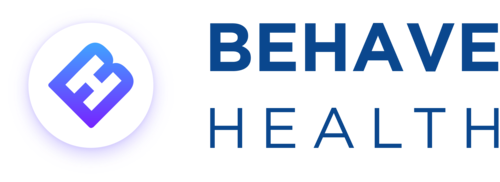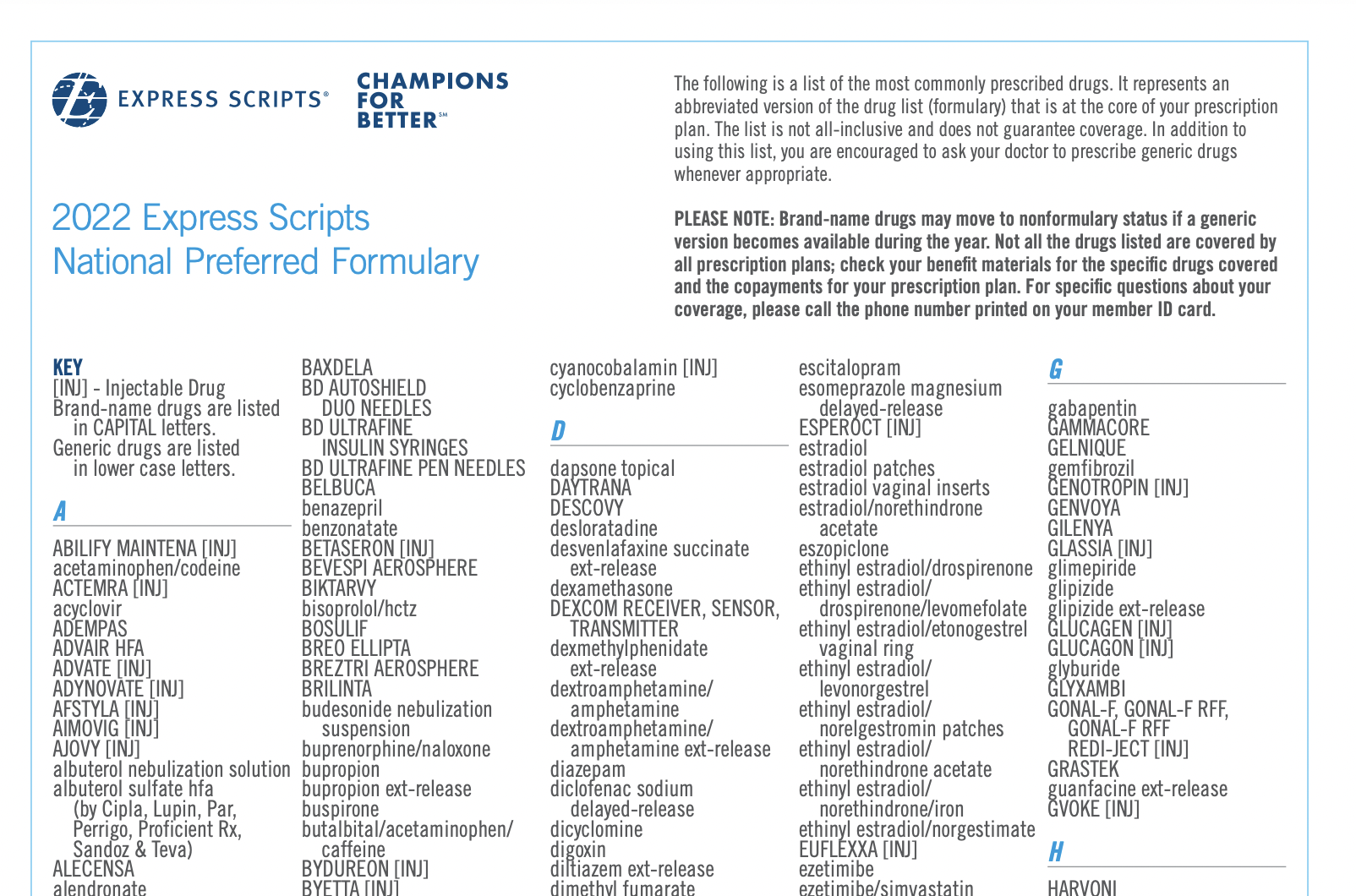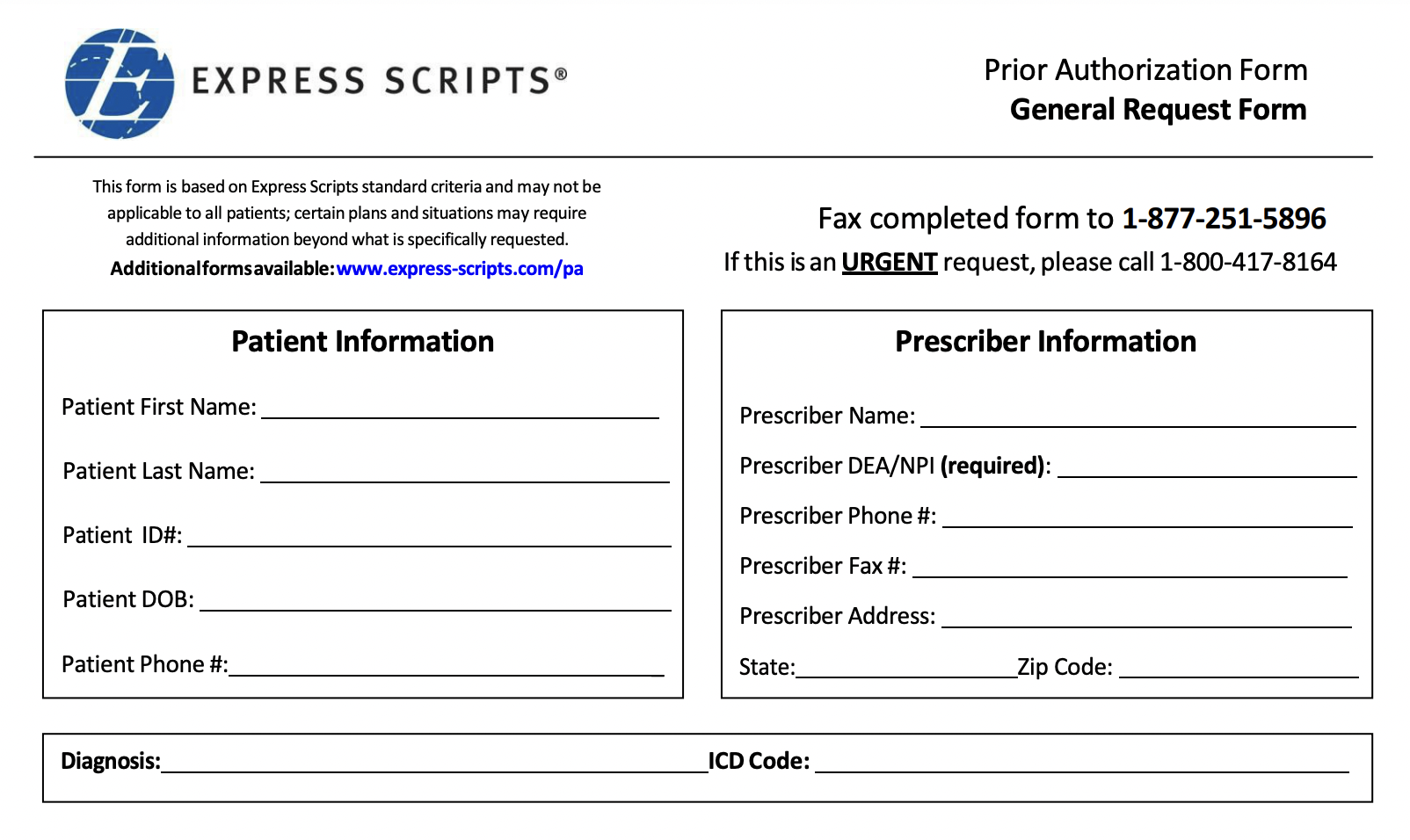Learn what treatment service categories are covered under Georgia Medicaid, as well as some of the most common CPT codes you’ll encounter when billing Medicaid for addiction treatment services in Georgia.
How to Bill Medicaid for Addiction Treatment in California
Therabill Versus Behave Health: Which EMR Software Solution is the Best Fit for Your Addiction Treatment Center?
Welligent or Behave Health? A Side-By-Side Comparison of Two Top Behavioral Health EMRs
Comparing ICANotes With Behave Health: What's the Best EMR for Your Behavioral Health Organization?
Choosing an EMR for Your Opioid Treatment Program or Suboxone Clinic
How to Complete Registration as a Provider or Pharmacy with Express Scripts, Inc. for Addiction Treatment Centers
Express Scripts is the largest pharmacy benefit management organization in the United States. It also operates one of the nation’s largest by-mail pharmacies. Over 85 million people receive pharmacy coverage through Express Scripts. The company counts revenues in excess of $100 billion per year. Express Scripts works with many different health insurance payers - government plans, employer plans, and personal plans - to cover the pharmaceutical piece of health insurance. Express Scripts was acquired in recent years by Cigna, and is also associated with Evernorth, a Cigna company.
How to Work with Addiction Treatment Patients Who are Express Scripts Members
There are several situations where an addiction treatment center may need to deal with medical billing for Express Scripts.
The main Express Scripts-related situation most addiction treatment providers will encounter is when an addiction treatment center offers Medication Assisted Treatment (or MAT) for patients in addition to other types of behavioral health services. Examples of common MAT drugs include methadone, Suboxone and Vivitrol.
When providing MAT in-house, addiction treatment centers will be required by federal guidelines to have a medical professional, whether that's a practice nurse, physician assistant, or advanced-practice pharmacist, on staff to dispense medication. Many states require additional credentials or conditions on top of these blanket federal requirements, so check your local regulations to be sure that you're complying with all applicable laws and regulations.
Are Addiction Treatment Centers Who Dispense MAT Considered “Providers” or “Pharmacies” by Express Scripts?
There is no single answer to this question. It depends on how closely you decide to work with Express Scripts at your addiction treatment facility.
If you want to be treated as an enrolled pharmacy with Express Scripts, you’ll need to complete credentialing and enroll as a participating pharmacy. In order to do that, you can email Express Scripts at NetworkCompliance@express-scripts.com with your pharmacy NCPDP number. Express Scripts urges all would-be participating pharmacies to remember that it can take up to 30 days to actually complete the enrollment process after Express Scripts receives your signed contract and completed application.
If you want to be treated as a provider, you do not need to complete an enrollment process. However, you will need to decide how you want to submit Prior Authorization requests.
What Addiction Treatment Medications Does Express Scripts Cover?
Unlike its leading competitor, CVS Health, Express Scripts covers both methadone and buprenorphine in its formulary. (FYI - A “formulary” is just the technical term for a list of medications that a pharmacy benefit company covers.) Generally speaking, members can access both types of medications, although there are restrictions on certain specifics. For example, certain sublingual film versions of the drugs aren’t covered and name-brand Suboxone isn't covered, while the FDA-approved generic version of buprenorphine is covered by Express Scripts.
When Does Express Scripts Require Prior Authorizations for Addiction Treatment Centers?
Express Scripts requires prior authorizations for many medications, including some medications associated with addiction treatment.
Specifically, Express Scripts requires prior authorization for buprenorphine.
However, Express Scripts does NOT require prior authorization for methadone.
Many psychiatric medications, including many antipsychotics and antidepressants, do require prior authorization with Express Scripts. At addiction treatment centers, it’s not uncommon for dual diagnosis patients to be prescribed medications such as these, as well.
How Do I Complete a Prior Authorization with Express Scripts for my Addiction Treatment Centers’ MAT Medications?
Fortunately, Express Scripts offers providers many options for completing prior authorizations.
You may:
-Use an EHR with built-in ePA capabilities
-Use one of several ePA provider portals online that works with Express Scripts (such as Surescripts, covermymeds or ExpressPAth)
-Submit traditional paper prior authorization request forms to Express Scripts by fax
Express Scripts states on their website that over 60% of providers submit ePA requests now, but that still leaves 40% of billing departments opting for paper versions. Whatever you choose, Express Scripts will require your NPI number, so have that at the ready.
Trouble with Addiction Treatment Registration for Express Scripts? We Can Help.
BehaveHealth’s Revenue Cycle Management (RCM) service includes soup-to-nuts, hyper-detailed, hands-on attention to every single component of your addiction treatment billing needs. We have strong working relationships with every major insurance company in the United States.
Even better, we’re not health care generalists. We only work for behavioral health providers like you.
Let our team of specialists handle it all:
Verification of Benefits
Utilization Review
Billing and Collections
Patient Responsibility
Denials and Appeals
Get your free trial started today and see why more addiction treatment centers prefer Behave Health.
How to Use Humana's Clinical Guidelines for Behavioral Health in Your Addiction Treatment Center's Billing Department
Opening an Addiction Treatment Center in Kansas: Low Fees and a Relatively Easy Process
Opening an Addiction Treatment Center in Iowa? The State’s Long-Standing SUD Problem Is Getting Worse, Not Better
Opening an Addiction Treatment Center in Louisiana? Here’s What You Need to Know
How to Open an Addiction Treatment Center in Pennsylvania
Pennsylvania is a great state to open an addiction treatment center. With a high number of people suffering from SUD, there is a high demand for services to treat the disease of addiction. Pennsylvania is also unique in the nation because it allows addiction treatment providers to prescribe medical marijuana to treat opioid use disorder.
How is Your Addiction Treatment Center Preparing for a Post-COVID World?
COVID-19 has created a perfect storm in the addiction treatment world. It seems these days we are being hammered from all sides: economic uncertainty, political (and policy) uncertainty and, of course, uncertainty about the course of the novel coronavirus itself. While all studies being done currently point to a massive surge in substance abuse in the United States, overall admissions in treatment are down as social isolation and concerns about safety erect new barriers to treatment. Some surveys are finding that 64% of addiction treatment centers are currently reporting revenue losses directly tied to the pandemic.
We’ve written extensively here about what you can do at your addiction treatment center to address the pandemic from a public health and economic health perspective. Certainly many readers are preoccupied with the day-to-day of responding to the crisis at hand as it continues to evolve.
It’s hard to think outside of this moment, but, as businesspeople, it’s important that we try.
Ask yourself: what happens next? What happens after COVID-19 is finally “over” (or at least more managed) and life no longer revolves around mitigating the risks associated with this virus?
What is your addiction treatment center doing to prepare for the post-COVID world?
Today, we’ll look at 4 things that appear to be on the horizon for the addiction treatment community and give you suggestions on what your organization might begin to do to prepare for what comes next.
Addiction Treatment Post-COVID Reality #1: Telehealth Is Here to Stay
In the wake of the pandemic, the vast majority of our readers have shifted their addiction treatment centers to rely heavily on telehealth services. Many of you are still offering in-person services, of course, and in some instances that level of care is absolutely necessary. But for those patients where telehealth is appropriate, it makes sense to improve social distancing for staff and patients by keeping unnecessary visits down.
The US Department of Health and Human Services renewed their COVID-19 emergency declaration for a third time last month, extending changed Medicare and Medicaid rules that allow for the reimbursement of telehealth services for members of those programs. Private insurers have also shifted to embracing telehealth coverage for patients during the pandemic.
Within the addiction treatment community, the migration to telehealth happened quickly in response to the pandemic, despite an historic resistance to pivoting away from face-to-face care. Despite concerns, most addiction treatment centers have seen no decrease in productivity or program effectiveness. Many have reported a marked decrease in no-shows.
It is reasonable to expect the trend towards telehealth to continue after COVID-19 as patients and providers gain a level of comfort with the modality.
If your facility is struggling with telehealth delivery, now is the time to address that problem. Be sure that your addiction treatment center is set up with the best EHR to handle the job.
Addiction Treatment Post-COVID Reality #2: National Trauma and Delayed Care Means a Tsunami of SUD Patients
It doesn’t take an addiction treatment professional to know that the national stress and trauma of the COVID-19 pandemic - as well as the economic and political stress that goes along with it - will cause more people to turn to drugs of abuse than ever before. Research is already proving that rates of addiction are skyrocketing in response to the difficulties we are all experiencing right now. What’s more, people in recovery are finding themselves relapsing as the routines and support structures they rely on are compromised by the pandemic.
It’s clear that we can expect a huge wave of addiction treatment patients in the near-future.
For addiction treatment centers, that means planning for a huge influx of patients at a time when cash flow is slowing to a trickle. It’s an impossible position.
What low-cost improvements can your organization make right now to help prepare for that eventual bump in admissions? When making new hires and acquiring new properties is out of the question, focus on tightening up what you already have. Updating your software is a great way to improve efficiency and productivity without investing too much capital.
Addiction Treatment Post-COVID Reality #3: Demand for MAT WIll be at an All-Time High
As restrictions around Suboxone and Methadone have loosened, patients are proving that they can handle the responsibility of take-home medications, despite the risks of diversion and abuse. Now that MAT patients - and providers - are growing accustomed to skipping the frequent (if not daily) in-clinic visits, it will be very difficult to go back to the older, more strict MAT rules. It seems likely that this is the “new normal” when it comes to MAT. With the rules relaxed and barriers removed, it makes sense that more patients will flock to these evidence-based medicines to help with their opioid addiction.
If your addiction treatment program shuns MAT patients and relies on an abstinence-only method, now is the time to reconsider your approach. While many organizations still rely on this older approach to recovery, it would be reckless to fail to notice that the tide is turning.
Addiction Treatment Post-COVID Reality #4: More States Decriminalizing Drugs Means Fewer Court-Mandated Patients
Oregon just voted to decriminalize possession of all drugs of abuse. Though it’s the only state in the union to do so, the Drug Policy Alliance, the national non-profit behind the Oregon measure, has its eyes set on passing more legislation to decriminalize drugs throughout our country. Regardless of what you believe personally about decriminalization, the effects on the addiction treatment industry remain the same.
In states that legalize drugs, we will see fewer court-ordered treatment patients.
For addiction treatment centers that rely heavily on the justice system for new admissions, these changes could be existential.
If this describes your addiction treatment organization, begin thinking now about how you will pivot in response to this change. It could mean improving your outreach efforts to certain communities, planning to invest in advertising campaigns or shifting your focus to a different niche within addiction treatment. Keep an eye out for developments in your state and plan accordingly.
We’re Here To Help
At BehaveHealth, we are committed to supporting the addiction treatment community through this turbulent time. Our cloud-based software solution is designed especially for addiction treatment providers just like you. We continue to update our software in response to the changing treatment environment so that you can forget about the tech and focus on providing the best care possible to your patients. Claim your free trial to see how we can help your addiction treatment organization thrive today.










